Attitude is Everything: Not only be open to the new things that come your way whether cuisine or access features but also when situations don’t go according to plan. Roll with it and you’ll be guaranteed to have a more pleasant and eye-opening experience.
1. Allen Wrenches: Bringing a portable set of Allen Wrenches will come in handy if your breaks get altered during flight or elsewhere or generally need to be tightened on your trip. Your caster wheels may also need adjustment or to be cleaned during your trip.
2. Tires: Check the air in your tires before leaving and maybe even bring a small portable pump or use solid rubber wheels.
3. Extra Air Seat Cushion (Roho recommended): This can be used during a taxi or airplane ride, in the shower, or if your other cushion gets damaged or whatnot. An air cushion can be deflated and packed down small.
4. Gloves! Bring a comfortable set of gloves (if not two for some travelers) to cushion your hands, provide grip, and generally protect your hands from elements such as small rocks and hot wheels.
5. Immune System: Boost your immune system with On Guard Essential Oil by dōTERRA, which consists of a blend of wild orange, clove bud, cinnamon, eucalyptus, and rosemary. Take a few days before you leave and every day during a trip to naturally boost your immune system. I swear by this stuff! Also, bring hand sanitizer to further protect yourself from common public sicknesses and when no soap is available in public restrooms.
6. Compression Socks: Good blood circulation helps the body stay healthy and compression socks are designed to improve this, especially for those with limited lower extremity mobility. Compression socks are also good for preventing leg swelling and helps the body to stay warm in colder weather.
7. Packing: A backpack is an essential carry-on luggage item when flying but is also a crucial daypack throughout the trip to hold water, clothing, souvenirs, etc. Or invest in another bag that can be attached to or stored underneath a wheelchair. When flying, use such bags as your carry-on and store medical supplies and if possible a change of clothing.
8. Medical Supplies: Bring extra supplies because you never know what can happen— flights get delayed, cars break down, bad weather brews, you need to use the restroom more, etc. This also means planning for possible illnesses you are prone to, like UTIs, so bring these meds too. In some counties proof of prescription is needed
9. Flying: Check in at the desk and remind staff if an aisle chair is needed to board the plane. At the jetway desk, get a claim ticket for your wheelchair so you can gate-check it. You can also remind the staff again that an aisle chair is needed. When boarding the plane remove any and everything that can fall off the wheelchair such as side-guards, seat cushions, etc. Watch Wheelchair Travel Trips on Airports and Plane Flights: check-in, security, aisle chairs, and more!
10. Reservations: When making reservations for anything— a plane flight, train ride, hotel, restaurant, etc.—notify the receiving party that you are in a wheelchair. This isn’t necessary per se but this prepares staff so you have a smoother and more pleasant experience. When making one at a hotel, be sure the bathroom setup fits your needs (roll-in vs. bathtub). If you can’t get the details you are looking for then ask to speak with someone else. As of March 15, 2012, the service and hospitality industry has higher standards for disabled customers to follow. Know your rights!
11. Getting Around: Have an idea about how you are going to get around once at your destination. Will you be wheeling a lot? If so, then use Google images to scout out the area and get a feel for the terrain. Will you have your own car or plan on renting? Or will you be using public transportation like buses, trains, and taxis? If relying on public transportation, you need to figure out what the wheelchair accessible options are because every city is different. If taxis are an option, have a phone number or two at hand before arrival.
12. Food and Beverage: One of the best ways to keep your body healthy while traveling is to keep it hydrated. Limit caffeine and sugar drinks as they are dehydrating and constrict blood flow. Think of investing in a cup holder for your wheelchair as this will allow you to carry water with you when clean water is not available and it frees up your hands and lap space. When traveling to a new area let your system adjust to the new foods and spices you encounter. Don’t shock your system because this leads to indigestion and irregular bowels, which can be unpleasant and inconvenient.
13. Great Outdoors: Get back to nature and get a “Golden Access” pass by applying online or picking one up at a national park gate (usually need to show some kind of proof) to get into any U.S. national park for free for life! Many states also have their own pass which discounts your entrance fee for state parks.
14. Getting Around with Maps: Cell phones don’t always work in rural areas, while at sea, and in other countries. If you do get service, you may be paying large fees for roaming which may cost more than your trip. Therefore, you cannot solely rely on your map or GPS will be able to navigate you. Bring maps you print out before you go or obtain local maps at train stations, hotels, and even major tourist attractions
15. Public Restrooms: Sometimes finding an accessible public restroom can be challenging, especially in other countries. However, even in the states restaurants, theaters, etc. may not have a wheelchair accessible restroom. When you need to go try looking for shopping centers, chain coffee shops, hotel lobbies, train/subway stations, airports, government buildings, banks, and fast food restaurants. Not all are guaranteed, especially outside the US, but these are your best bets.

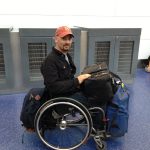

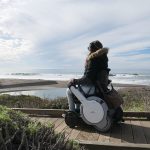
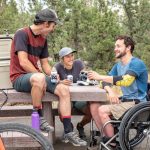

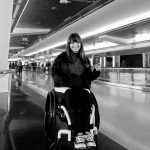
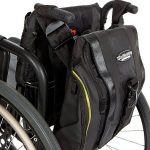
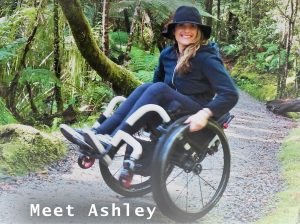

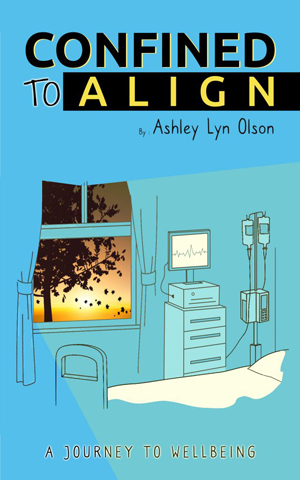
Seems obvious, but DON’T put your Allen wrenches in your carry on. They WILL be removed by security. Put them in your check in luggage. I’ve lost three sets this way.
I keep a tool kit in my backpack and security always checks it out, but when we explain that it’s for repairs on my chair and they see there are no blades of any kind, they always let me keep it.
My husband and I are taking my grown son to Hawaii in June. This is the first time he’s flown since his accident in 2007, and I’m poring over all sorts of sites to find out what to do, what not to do, etc. This article mentioned not checking in at the kiosk, but to check in at the gate. I thought my son HAD to check in at the kiosk, rather than doing the check-in online the day before. If it’s possible for him to avoid the kiosk line, I’d prefer that!!! We’re flying Hawaiian Air
Valerie: Hawaii?! How wonderful for you all! Don’t worry, you are doing great. You are correct. It is best to speak to a real live person the day of when you check-in. When you do check in, remind whoever you speak that you need an aisle chair for your son to board the plane (if you do not carry him) even if it is noted on your reservation. So if you don’t need this equipment then use the faster line. That’s what I would do.